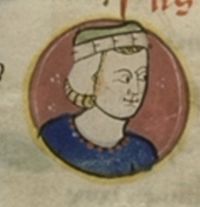Margaret, Marchioness of Namur
Appearance
| Margaret de Courtenay | |
|---|---|
Yolanda of Flanders |
Margaret, Marchioness of Namur (c. 1194 –
Yolanda of Flanders (d. 1219). By marriage to Henry I, Count of Vianden (d. 1252), she was Countess-consort of Vianden
.
Life

Margaret (also called Sybille, in some later sources) married Raoul, Lord of
Raoul I of Exoudun (d. 1219). Her husband died c. 1213/5 and Margaret succeeded him as Lady of Châteauneuf-sur-Cher and Mareuil-en-Berry. Soon after that (c. 1216) she married Henry I, Count of Vianden (d. 1252). Henry was the son of Frederic III, Count of Vianden (d. 1217), and his wife Matilda (de)
.
In 1216, Margaret′s father
Baldwin II of Constantinople. Since the elevation to the imperial throne in Constantinople (1216), Margaret′s family became involved in creation of new dynastic policies and alliances.[1]
Marchioness of Namur
Margaret became
Baldwin II of Courtenay.[citation needed
]
Henry and Margaret continued ruling
Guy of Dampierre, count of Flanders
and Henry was removed by military force but they made peace with family marriage.
Later life
After the death of her husband in 1252, Margaret entered a convent in Marienthal near Luxembourg and became a nun. She died in Marienthal on 17 July 1270 and was buried there.[citation needed]
Issue
Margaret and Henry had several children, including:[citation needed]
- Peter, dean in cathedrals of Liège and Cologne (died after 1272).
- Frederic of Vianden, who died in 1247 (5 years before his father). He married Matilda of Count of Ardennes (seigneur de Viviers, c. 1190–1246 ?), and had a son named Henry, Lord of Schönecken(1248–1299).
- Henry I van Vianden (d. 1267), bishop of Utrecht from 1249 to 1267.
- Philip I (d. 1273), Count of Vianden 1252–1273. He married Marie of Brabant-Perwez, daughter of Godfrey of Louvain, Lord of Perwez, apparently a descendant of Godfrey III, Count of Louvain and Landgrave of Brabant (1142–1190). Their issue was Godefroid I, Count of Vianden (d. 1307 or 1310) and four other children.
- Yolanda of Vianden (1231–1283), prioress of Marienthal, still revered today in Luxembourg.
Ancestry
| Ancestors of Margaret, Marchioness of Namur | ||||||||||||||||||||||||||||||||||||||||||||||||||||||||||||||||||||||||||||||||||||||||
|---|---|---|---|---|---|---|---|---|---|---|---|---|---|---|---|---|---|---|---|---|---|---|---|---|---|---|---|---|---|---|---|---|---|---|---|---|---|---|---|---|---|---|---|---|---|---|---|---|---|---|---|---|---|---|---|---|---|---|---|---|---|---|---|---|---|---|---|---|---|---|---|---|---|---|---|---|---|---|---|---|---|---|---|---|---|---|---|---|
| ||||||||||||||||||||||||||||||||||||||||||||||||||||||||||||||||||||||||||||||||||||||||
References
- ^ Angold 2011, p. 47–68.
- ^ McDaniel 1984, p. 43.
- ^ McDaniel 1986, p. 196.
Sources
- ISBN 9781409410980.
- Bácsatyai, Dániel (2017). "A 13. századi francia–magyar kapcsolatok néhány kérdése" (PDF). Századok. 151 (2): 237–278.
- McDaniel, Gordon L. (1984). "On Hungarian-Serbian Relations in the Thirteenth Century: John Angelos and Queen Jelena" (PDF). Ungarn-Jahrbuch. 12 (1982-1983): München, 1984: 43–50.
- McDaniel, Gordon L. (1986). "The House of Anjou and Serbia". Louis the Great: King of Hungary and Poland. Boulder: East European Monographs. pp. 191–200. ISBN 9780880330879.
